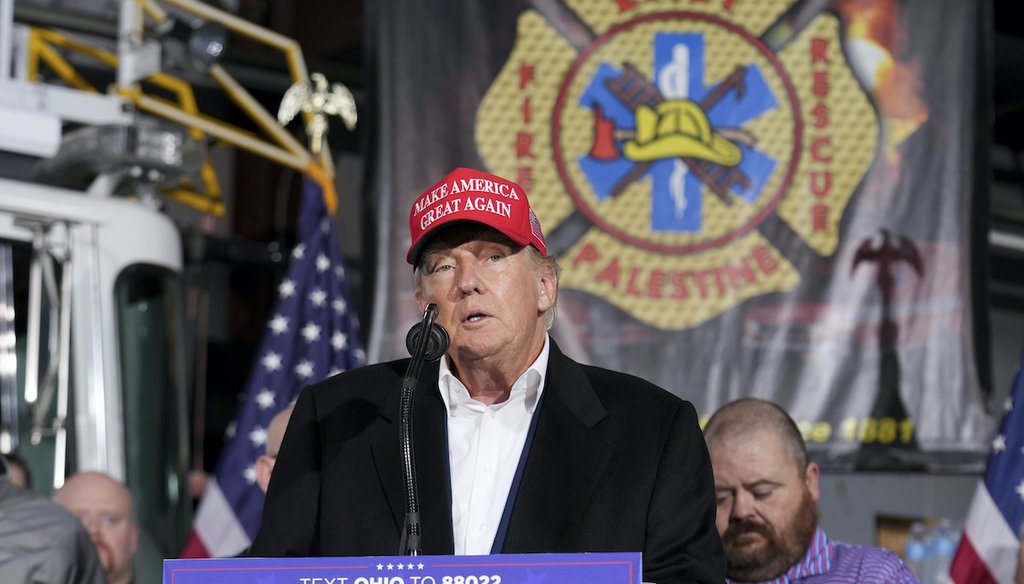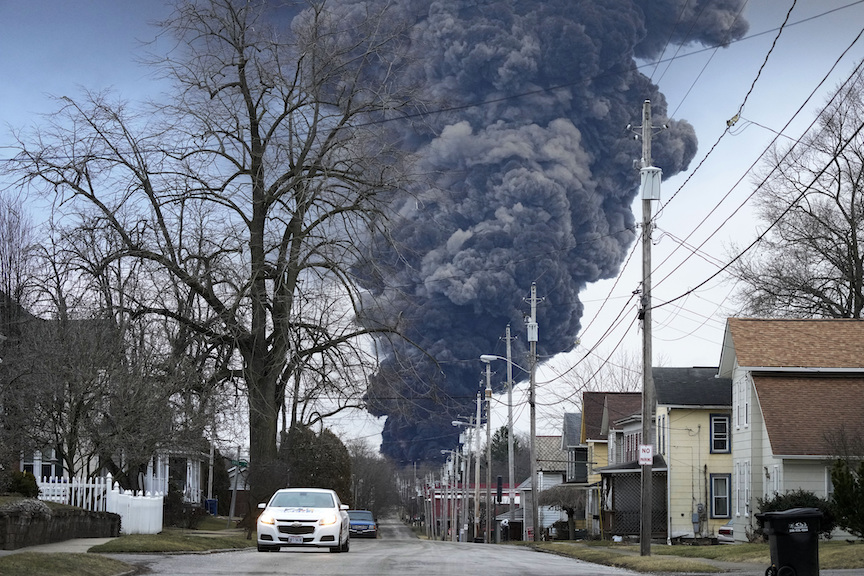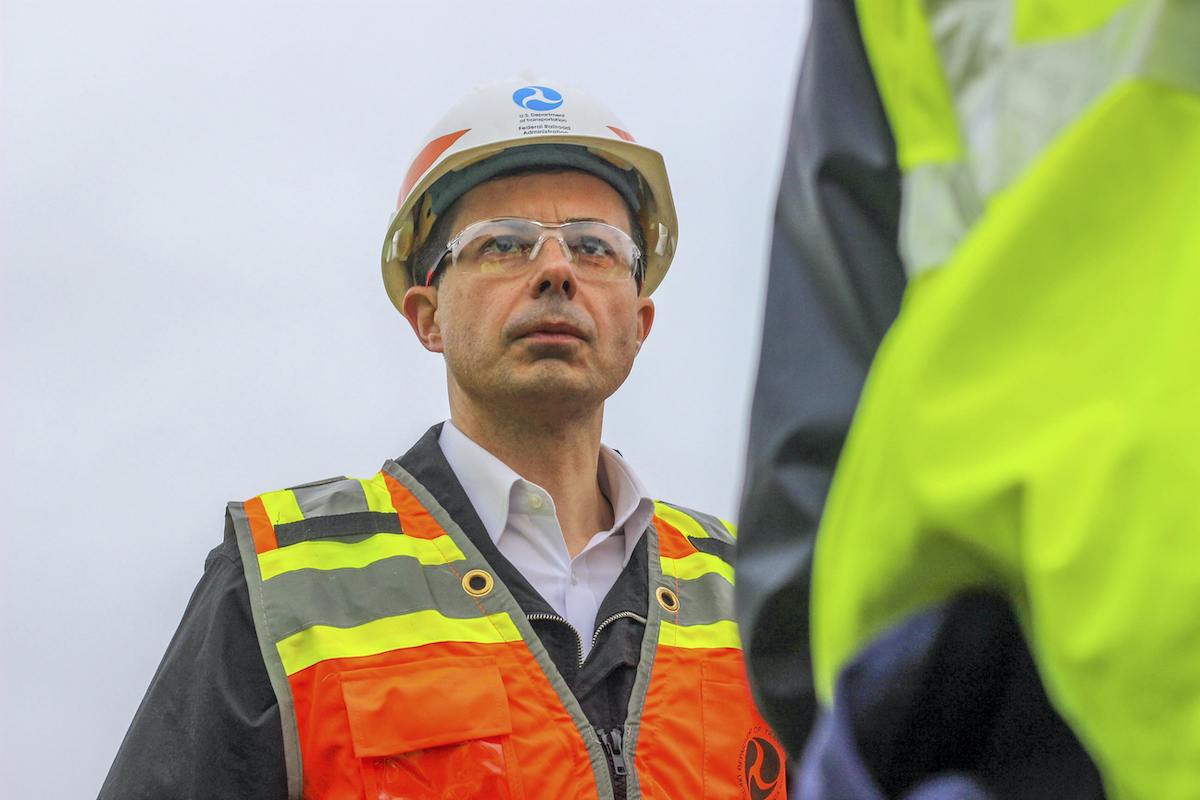Get PolitiFact in your inbox.

Former President Donald Trump speaks at the East Palestine Fire Department as he visits the area in the aftermath of the Norfolk Southern train derailment Feb. 3 in East Palestine, Ohio, Feb. 22, 2023. (AP)
If Your Time is short
-
The Trump administration repealed an Obama-era rule requiring high-hazard cargo trains to be equipped with electronically controlled pneumatic brakes by 2023, allowing them to brake faster.
-
Even if this safety rule was in effect, it would not have applied to the Norfolk Southern train that derailed in East Palestine, Ohio, because it was not categorized as a high-hazard cargo train.
-
A preliminary report from the National Transportation Safety Board said a wheel bearing overheated ahead of the accident, but the incident remains under investigation.
At a McDonald’s in East Palestine, Ohio, former President Donald Trump picked up the lunch tab for first responders and dished out his own take on the Biden administration’s response to the train derailment in that community.
A reporter at the restaurant asked Trump about U.S. Transportation Secretary Pete Buttigieg’s "criticism of you pulling back rail regulations."
Trump replied: "I had nothing to do with it." Another person asked Trump how he felt about being blamed for "some of the problems with the rail." Trump replied, "It’s actually hard to believe."
Trump’s critics cried foul about his "nothing to do with it" statement, pointing to evidence that Trump’s administration changed a rule related to train brakes in 2018, something we documented in a previous fact-check. So in that regard, he did have something to do with rail regulations.
But the specifics of the Obama-era rule that the Trump administration reversed did not apply to the Norfolk Southern freight train that derailed in Ohio.
The Trump administration reversed an Obama-era rule about brakes

A black plume rises over East Palestine, Ohio, on Feb. 6, 2023, as a result of a controlled detonation of a portion of the derailed Norfolk Southern trains. (AP)
In 2014, following several high-profile train derailments, the Pipeline and Hazardous Materials Safety Administration and the Federal Railroad Administration (which both operate under the Department of Transportation) proposed rules to bolster safety standards for trains carrying hazardous materials.
A year later, these two agencies finalized the rule for trains carrying high-hazard, flammable materials. New trains were required to have electronic brakes, and older trains were required to be retrofitted with them by 2023. Electronically controlled pneumatic brakes work on all train cars simultaneously. This allows the train to brake faster than when equipped with conventional air brakes, which are applied sequentially along the length of the train.
A high-hazard flammable unit train was defined as a train going faster than 30 miles per hour with at least 70 loaded tank cars containing certain highly flammable liquids, such as crude oil and ethanol.
After this rule was enacted, lobbyists for railway and oil companies pushed to repeal it, questioning the effectiveness of electronic brakes and arguing that the cost of installing them was too high.
Then in 2018, under the Trump administration, the Department of Transportation repealed the rule based on government reports that determined equipping high-hazard cargo trains with electronic brakes was not economically justified. The Associated Press reported that these government reports omitted up to $117 million in estimated future damages from train derailments that could be avoided by using electronic brakes.
Following the Feb. 3 East Palestine derailment, Earthjustice, an environmental group, sent Buttigieg a letter asking the administration to reverse the change that the Trump administration made to the brake rule.
Trump campaign spokesperson Steven Cheung pointed to our previous fact-check, which stated that even if this safety rule had still been in effect, it would not have applied to the train that derailed in East Palestine because it was not categorized as a high-hazard cargo train.
Although the train contained hazardous materials, including vinyl chloride, it did not meet the Department of Transportation’s narrow definition of a high-hazard flammable unit train because it didn’t have at least 70 cars containing flammable materials, such as crude oil or ethanol. The chemicals it was carrying fall into a different classification not included in this definition.
Cheung also pointed to a statement by National Transportation Safety Board Chair Jennifer Homendy, who said it is "false" to state that if the brake rule was implemented it would have prevented the derailment.
Cheung also said that it wasn’t the brakes that caused the derailment, pointing to a Feb. 6 AP article that said "a mechanical issue with a rail car axle" caused the derailment. But that article also stated that the derailment remained under investigation.
A preliminary report from the National Transportation Safety Board said a wheel bearing overheated ahead of the accident. The derailed equipment included 11 tank cars carrying hazardous materials that subsequently ignited. The derailment spilled chemicals onto the ground, water and air.
Buttigieg highlighted rule reversed by the Trump administration

Transportation Secretary Pete Buttigieg tours the site of the Feb. 3, 2022, Norfolk Southern train derailment Feb. 23, 2023, in East Palestine, Ohio. (AP)
We sent Cheung our fact-check explaining Trump’s reversal of the Obama-era rule and asked why Trump said he had nothing to do with that.
"He was asked specifically about the Biden administration falsely blaming him," Cheung said.
Buttigieg has called out the Trump administration for the rule change, but has not said that the former administration was to blame for the derailment.
In a Feb. 14 tweet, Buttigieg said, "We’re constrained by law on some areas of rail regulation (like the braking rule withdrawn by the Trump administration in 2018 because of a law passed by Congress in 2015), but we are using the powers we do have to keep people safe."
While visiting East Palestine on Feb. 23, a day after Trump’s visit, Buttigieg called on Trump to support reversing the rule change.
"One thing he could do is he could express support for reversing the deregulation that happened on his watch," Buttigieg said. "I heard him say he had ‘nothing to do with it’ even though it was in his administration. So, if he had nothing to do with it and they did it in his administration against his will, maybe he could come out and say that he supports us moving in a different direction."
Buttigieg has also called on Congress to strengthen rail safety by increasing fines against rail companies, strengthening rules governing high-hazardous shipments and accelerating plans to phase in safer tank cars carrying hazardous materials.
PolitiFact researcher Caryn Baird contributed to this story.
RELATED: Obama-era safety rule for high-hazard cargo trains was repealed under Trump
RELATED: Did Ohio train derailment cause CDC to update its vinyl chloride toxicology info? No
RELATED: Ohio train derailment: How FEMA and other federal agencies are aiding East Palestine
Our Sources
C-SPAN, Former President Trump Visits Fast Food Restaurant in East Palestine, Ohio, Feb. 22, 2023
The Recount, Tweet of Trump interview, Feb. 22, 2023
The Recount, Clip of Pete Buttigieg, Feb. 23, 2023
U.S. Department of Transportation Secretary Pete Buttigieg, Twitter thread, Feb. 14-15, 2023
NTSB, Norfolk Southern Railway Train Derailment with Subsequent Hazardous Material Release and Fires, Feb. 23, 2023
Jennifer Homendy, NTSB chair, Tweet, Feb. 16, 2023
US Department of Transportation, USDOT Secretary Buttigieg Calls on Rail Industry to Take Immediate, Commonsense Steps to Improve Accountability and Safety and Highlights Ways Congress Can Support these Efforts, Feb. 21, 2023
New York Times, The Trump Administration Rolled Back More Than 100 Environmental Rules. Here’s the Full List. Jan. 20, 2021
Email exchange with Occupy Democrats spokesperson, Feb. 16, 2023
Email exchange with Jennifer Gabris, National Transportation Safety Board spokesperson, Feb. 16, 2023
Harvard Law School Environmental & Energy Law Program, "Crude by Rail and Electronically Controlled Pneumatic Braking Systems," January 2021
Federal Register, "Hazardous Materials: Enhanced Tank Car Standards and Operational Controls for High-Hazard Flammable Trains," May 8, 2015
Federal Register, "Hazardous Materials: Removal of Electronically Controlled Pneumatic Brake System Requirements for High Hazard Flammable Unit Trains," Sept. 25, 2018
National Library of Medicine, "Vinyl chloride," accessed Feb. 16, 2023
PolitiFact, "The Ohio train derailment: What we know about health, environmental concerns," Feb. 15, 2023
PolitiFact, "Ohio derailment is just the latest serious industrial accident in the U.S.," Feb. 15, 2023
PolitiFact, "Ask PolitiFact: We’ve seen reports of three train derailments this month. Is this normal?," Feb. 16, 2023
The New York Times, "The Trump Administration Rolled Back More Than 100 Environmental Rules. Here’s the Full List.," Jan. 20, 2021
Associated Press, "APNewsBreak: US miscalculated benefit of better train brakes," Dec. 20, 2018
The Lever, "Rail Companies Blocked Safety Rules Before Ohio Derailment," Feb. 8, 2023
National Oceanic and Atmospheric Administration, "A Train Derails in Paulsboro, N.J., Releasing 23,000 Gallons of Toxic Vinyl Chloride Gas," Dec. 17, 2012
NPR, "Train Derailment In North Dakota Causes Explosion, Fire," Dec. 30, 2013
CNN, "Oil tank cars derail, burn in Virginia," April 30, 2014
BBC, "Lac-Megantic: The runaway train that destroyed a town," Jan. 19, 2018
AP, AP Exclusive: Transport safety rules rolled back under Trump, Feb. 26, 2018
STAT News, Experts weigh in on potential health hazards posed by chemicals in Ohio train derailment, Feb. 21, 2023
U.S. Department of Transportation, Statement to PolitiFact, Feb. 23, 2023
Email interview, Steven Cheung, Donald Trump campaign spokesperson, Feb. 23, 2023
Email interview, Sonya Lunder, senior toxics policy advisor for the Sierra Club, Feb. 23, 2023











































